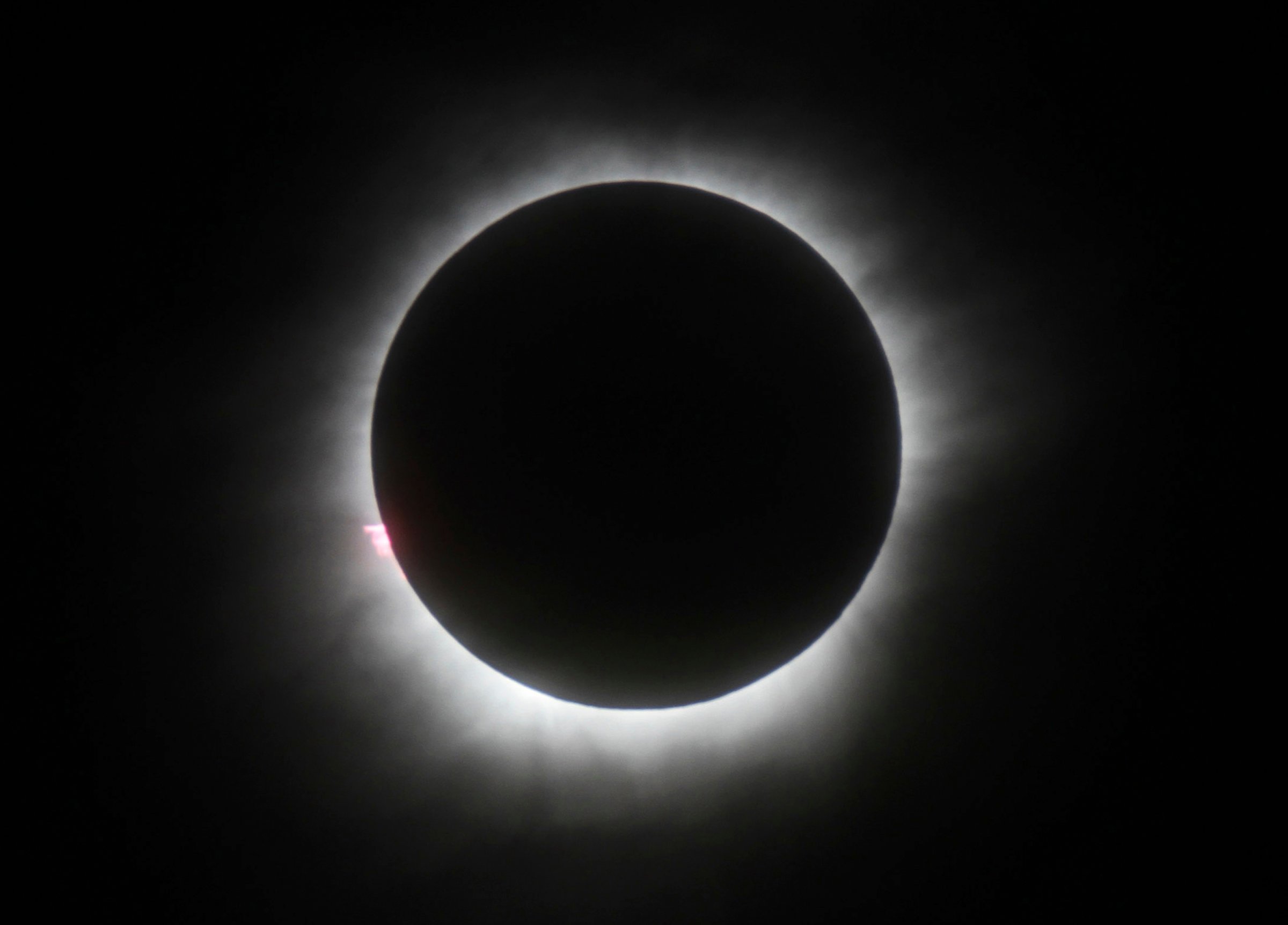
On Monday, Aug. 21, the contiguous U.S. will experience a total solar eclipse for the first time since 1979. The eclipse, which occurs when the moon passes directly between the sun and the Earth, will cross the country from the West Coast to the East Coast, leaving portions of 14 states momentarily immersed in darkness. Even those states that don’t see a total eclipse will experience a partial eclipse, which occurs when the moon only blocks a portion of the sun, a phenomenon that can last for about two or three hours.
The total solar eclipse will cover an area that is about 70 miles wide and will move diagonally across the country from Oregon to South Carolina. While the map of the eclipse’s path of totality touches 14 states, it clips a few very narrowly. This leaves just 10 states — Oregon, Idaho, Wyoming, Nebraska, Missouri, Illinois, Kentucky, Tennessee, Georgia, and South Carolina — that will get a good view of the total eclipse, as long as the weather cooperates, according to NASA.
Find out what time the eclipse will be visible in each of those states below:
Oregon
Sky gazers in Lincoln Beach, Ore. will be the first to see the solar eclipse, starting at 9:05 a.m. PDT. The time totality begins there is 10:16 a.m. PDT.
Those in the city of Madras, Ore. will then see the eclipse just a minute later at 9:06 a.m., according to NASA. Totality begins there at 10:19 a.m, ending around 10:21 a.m. The entire eclipse will be over by 11:41 a.m.
Idaho
Those in Idaho Falls, Idaho will see the solar eclipse starting at 10:15 a.m. MDT. Totality begins just over an hour later, at 11:33 a.m. Totality will then end at 11:34 a.m., and the entire eclipse ends at 12:58 p.m.
Wyoming
Onlookers in Casper, Wyo. are next up, able to view the eclipse at 10:22 a.m. MDT. The time totality begins is 11:42 a.m., and it ends around 11:45 a.m. The eclipse will end there at 1:09 p.m., according to NASA.
Nebraska
The solar eclipse then moves over Lincoln, Neb. at 11:37 a.m. CDT. Totality begins at 1:02 p.m., ending just two minutes later at 1:04 p.m. The eclipse will be entirely over in Lincoln at 2:29 p.m.
Missouri
Jefferson City, Mo. will be experience the eclipse next. The eclipse will begin at 11:46 a.m. CDT there, with totality occurring at 1:13 p.m, then ending at 1:15 p.m. The eclipse will be over at 2:41 p.m.
Illinois
The eclipse in Carbondale, Ill. begins at 11:52 a.m. CDT. The time totality begins is 1:20 p.m., leaving the sun completely covered for two minutes and 40 seconds — its longest duration, according to NASA. The eclipse will be over there by 2:47 p.m.
Kentucky
Paducah, Kentucky will be able to see the solar eclipse starting at 11:54 a.m. CDT, with totality beginning at 1:22 p.m. Totality ends there at 1:24 p.m., and the eclipse ends at 2:49 p.m.
Tennessee
Nashville, Tenn. will see the eclipse starting at 11:58 a.m. CDT. The time totality will begin is 1:27 p.m., and it will end two minutes later at 1:29 p.m. The eclipse will end at 2:45 p.m.
Georgia
The solar eclipse will start in Clayton, Ga. at 1:06 p.m. EDT, and totality will begin at 2:35 p.m. Totality will end at 2:38 p.m., and the eclipse will end at 4:01 p.m.
South Carolina
Columbia, S.C is the second to last city to experience the solar eclipse, which starts at 1:13 p.m. EDT. The time totality will begin is 2:41 p.m. Totality ends at 2:44 p.m., and the eclipse ends at 4:06 p.m.
The total eclipse will end near Charleston, S.C. at 2:48 p.m. EDT.
More Must-Reads from TIME
- Why Trump’s Message Worked on Latino Men
- What Trump’s Win Could Mean for Housing
- The 100 Must-Read Books of 2024
- Sleep Doctors Share the 1 Tip That’s Changed Their Lives
- Column: Let’s Bring Back Romance
- What It’s Like to Have Long COVID As a Kid
- FX’s Say Nothing Is the Must-Watch Political Thriller of 2024
- Merle Bombardieri Is Helping People Make the Baby Decision
Contact us at letters@time.com